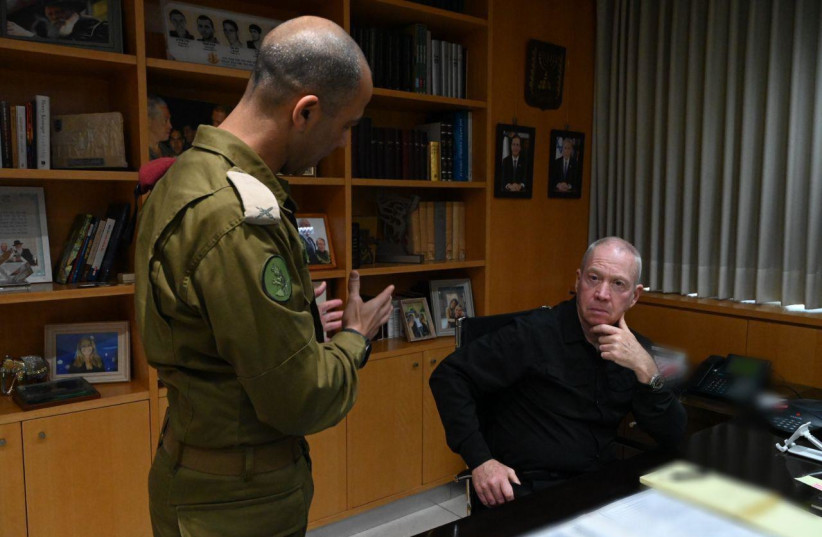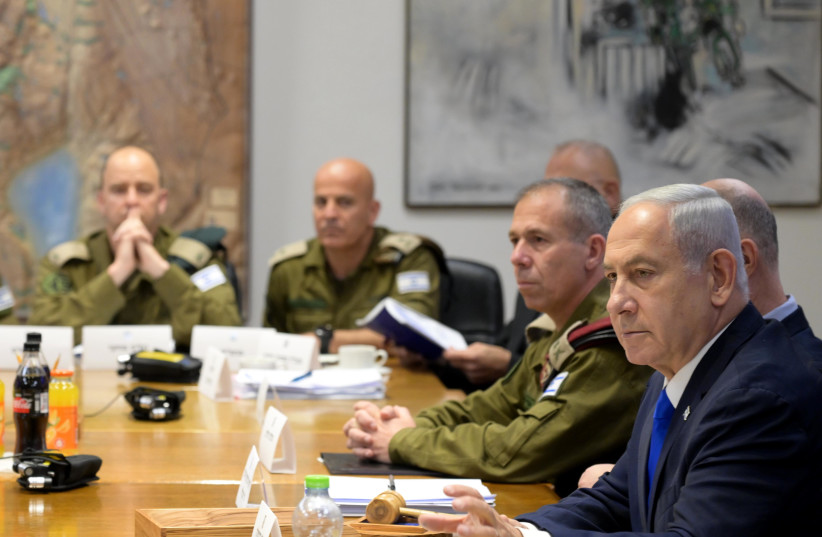"What happened to Prime Minister Benjamin Netanyahu?"
This is a question that many in Israel and around the world -- both common people and political leaders -- asked during the tumultuous first three months of this government's reign as the judicial overhaul issue completely overshadowed everything else.
"What happened to Netanyahu's pledge to have two hands on the wheel?" they asked.
"What happened to his political acumen? What happened to his instincts? What happened to his caution? How was he allowed the country's economy, international status, and security situation to deteriorate so rapidly? Why was he being led by the most extreme elements in his coalition and his party, rather than leading them? How was he just watching his legacy unravel?"
And then on March 27, one day after Netanyahu made the baffling decision to fire Defense Minister Yaov Gallant for calling for a halt in the judicial reform process -- a decision that spontaneously led tens of thousands of people into the streets to protest -- Netanyahu began to return to himself.

The first sign was the decision that day -- despite howls of disapproval from the Right within his coalition and his party -- to hit the pause button, halt the judicial overhaul legislation racing through the Knesset, and begin a dialogue over the matter.
The second sign came two weeks later, on April 11 toward the end of Passover, with his decision to ban Jewish visitors from the Temple Mount until the end of Ramadan, 10 days later, to de-escalate tensions around the site. This decision came despite National Security Minister Itamar Ben-Gvir's fierce opposition.
If up until March 27 it appeared to many that Netanyahu's interests in political survival were trumping his natural instincts toward caution that were on display for most of his long term as premier, now it appeared that his instincts were finally re-asserting themselves. And Netanyahu's instinct is to be careful, not to act impulsively or take dramatic steps without giving them much consideration, and without considering unintended consequences.
Operation Shield and Arrow
The launch of Tuesday morning's Operation Shield and Arrow -- a meticulously planned and executed action in Gaza in response to last week's firing by Islamic Jihad of more than 100 rockets at Israel -- is a further sign of the "old" Netanyahu re-emerging.
This operation was not launched impulsively nor under pressure from political rivals both inside and outside the coalition.
Tuesday morning's killing of the three senior Islamic Jihad terrorists sent a loud message to Islamic Jihad, Hamas, and their sponsors that the current domestic crisis in Israel has not rendered the country feeble. The message to Israel's enemies is clear: don't test the country, despite its internal chaos it still has the will and capacity and the ability to act in a big way.
Remember all that noise about reserved pilots who threatened a couple of months ago in the heat of the judicial reform debate that they would not show up for reserve duty? Well, they did show up this week. Among the 40 aircraft involved in the operation, some of them were reportedly flown by reserve pilots.
Tucked inside that overriding message to Israel’s enemies, however, Netanyahu delivered another message -- a secondary one -- to Israelis and to his coalition partners: "I, Netanyahu, am in charge; I, Netanyahu, will lead and not be led."
Following Islamic Jihad's firing of more than 100 rockets on Israel after the death last week of Islamic Jihad hunger striker Khadar Adnan, Ben-Gvir led the chorus of right-wing voices inside the coalition skewering Netanyahu for what they viewed as a tepid response. Ben-Gvir coupled his CRITICISM with a decision that his party would boycott Knesset and cabinet meetings until the government adopted a “fully right-wing policy.”
Netanyahu could have shot from the hip following the rocket barrage, but he didn't. He waited patiently and ignored the background noise that was not only coming from Ben-Gvir, but also from opposition figures criticizing him for not acting more forcefully. He was mocked for saying during the campaign that he would provide the country with security, and former Prime Minister Naftali Bennett's tweeted that more rockets fell in one night under Netanyahu than during his entire term as prime minister.
But then Netanyahu hit, and he hit hard and at a time of Israel's choosing. His message to his critics -- both inside the coalition and in the opposition -- was simple: "I'll do things my way."
The way that this operation was approved is instructive: Netanyahu convened his security cabinet 18 hours after the attack, not prior. That says a lot. It shows that the prime minister is wary of the input of some of the ministers on the security cabinet - such as Ben-Gvir and Finance Minister Bezalel Smotrich - and that he wants to cut them out of the loop so as not to be pushed into more extreme actions and adventures that he fears may have negative consequences.

Netanyahu also reportedly did not convene the security cabinet -- and received the attorney general's okay to launch the operation without holding a security cabinet vote -- because he was afraid that the operation's plans, which were dependent on a surprise for its success, would have been leaked out.
All of this is a sign that Netanyahu doesn't trust the judgment and instincts of some of those sitting around the security cabinet table. On this matter, he acted together with Gallant and Chief of Staff Lt.-Gen Herzi Halevi. He neither wanted nor needed the input of his security cabinet, and the way the operation was approved made that clear.
Ever since Israel entered a cycle of non-stop elections in 2019, every significant security decision made by the government has been taken under a cloud of suspicion that it served a political purpose. Either the government was taking action in Gaza or Syria because it wanted to win political points, or it was not taking action because it was afraid of failure and the possibility of losing political points.
This time is no different. There are those who said Netanyahu acted forcefully to shore up his sagging poll numbers, and others who argued that he acted to appease Ben-Gvir.
But both those arguments miss the point. Less than a month ago, Israel faced near-simultaneous attacks from Lebanon, Syria, Gaza, and in Jerusalem and Judea and Samaria. Last week, after a terrorist who decided to starve himself to death actually died, Israel came under one of the worst barrages of rocket fire it has faced in years. And all that took place as domestic turmoil continued to roil the country. Israel's deterrence was fraying, its will to fight was being questioned by its enemies.
On Tuesday, Netanyahu decided to deal with it in his own way. In the process, he also put his recalcitrant coalition partners on notice that he viewed himself as still very much in charge.
At least this time.
